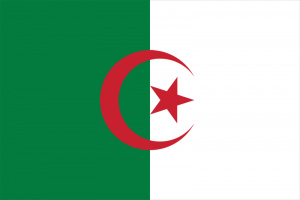Language/Algerian-arabic/Grammar/Plurals
Hi Algerian Arabic learners! 😊
In this lesson, we will be learning about plurals in Algerian Arabic. We will go over the plural forms of nouns, adjectives, and verbs. Understanding plurals is essential for communicating effectively in any language, and Arabic is no exception. By the end of this lesson, you will be able to form plurals in Algerian Arabic with ease. Let's get started!
Don't hesitate to look into these other pages after completing this lesson: Alphabet and Pronunciation in Algerian ..., Numbers in Algerian Arabic, How to Use Have & Conditional Mood.
Plural Nouns[edit | edit source]
In Algerian Arabic, most nouns form their plurals by adding "-in" to the singular form. Some examples include:
| Algerian Arabic | Pronunciation | English |
|---|---|---|
| بيت (bayt) | [bæjt] | house |
| بيتين (bytin) | [bæjtiːn] | houses |
| كتاب (kitab) | [kiːtæb] | book |
| كتب (kutub) | [kutub] | books |
| قرش (grush) | [ɡreʃ] | shark |
| قروش (gruwush) | [ɡruːwuʃ] | sharks |
There are some exceptions to this rule, so it's important to memorize the plural forms of nouns as you encounter them.
Here is an example dialogue to help reinforce the concept:
- Person 1: مرحبا، شحال البيت؟ (marhaba, shhal el-bayt?) (Hello, how's the house?)
- Person 2: البيتين طيبين، شكرا. (el-baytin tayyebin, shukran.) (The houses are good, thank you.)
Plural Adjectives[edit | edit source]
Adjectives in Algerian Arabic are also pluralized by adding "-in" to the singular form. However, if the singular form of the adjective ends in a long vowel or a consonant, "-at" is added instead. For example:
| Singular | Plural |
|---|---|
| جديد (jdīd) | جديدین (jdīdīn) |
| تقيل (tqīl) | تقيلات (tqīlāt) |
| كبير (kbīr) | كبيرين (kbīrīn) |
Here is an example dialogue to help reinforce the concept:
- Person 1: هاذي السيارة جديدة وتقيلة وكبيرة (hādhi s-siyāra jdīda w tqīla w kbīra) (This car is new, heavy, and big.)
- Person 2: نعم، والسيارتين هدوك يلي في الباش يلي ولدتي فيه (naʿam, w s-siyārteyn hdūk ylī fī l-bāsh ylī wlidtī fīh) (Yes, and the two cars over there in the courtyard are the ones I was born in.)
Plural Verbs[edit | edit source]
The plural forms of verbs in Algerian Arabic vary depending on the subject pronoun. In the present tense, the plural subject pronoun is "نحن" (naHnu), meaning "we." Here are some examples of present tense verb conjugations in the plural form:
| Verb | Plural (we) |
|---|---|
| نحن نقول (naHnu nʾūl) | we say |
| نحن نفهم (naHnu nfhm) | we understand |
| نحن نعطي (naHnu nʿtī) | we give |
Here is an example dialogue to help reinforce the concept:
- Person 1: نحن ندرس اللغات في المدرسة. (naHnu ndrs el-lughaat f el-madressa.) (We study languages at school.)
- Person 2: نحن أيضاً ندرس اللغات في Polyglot Club. (Polyglot Club شي حلو، تابعنا على الموقع!) (We also study languages at Polyglot Club. It's great, follow us on the website!)
Remember, the best way to reinforce these concepts is to practice with native speakers. Find native speakers and ask them any questions.
Recap[edit | edit source]
- Most nouns form their plural in Algerian Arabic by adding "-in" to the singular form. - Most adjectives form their plural in Algerian Arabic by adding "-in" to the singular form, unless the singular form ends in a long vowel or consonant, in which case "-at" is added. - The present tense plural form of verbs in Algerian Arabic is formed by adding the appropriate subject pronoun before the conjugated verb.
And that's it! We hope you found this lesson helpful in your journey to master Algerian Arabic Grammar. Keep practicing! 😊
➡ If you have any questions, please ask them in the comments section below.
➡ Feel free to edit this wiki page if you think it can be improved. 😎
Sources[edit | edit source]
Other Lessons[edit | edit source]
- Definite Articles in Algerian Arabic
- Numbers in Algerian Arabic
- Imperative Mood
- Future Tense
- Prepositions
- Adjectives
- Indefinite Articles in Algerian Arabic
- Past Participle in Algerian Arabic
- Past Tense

